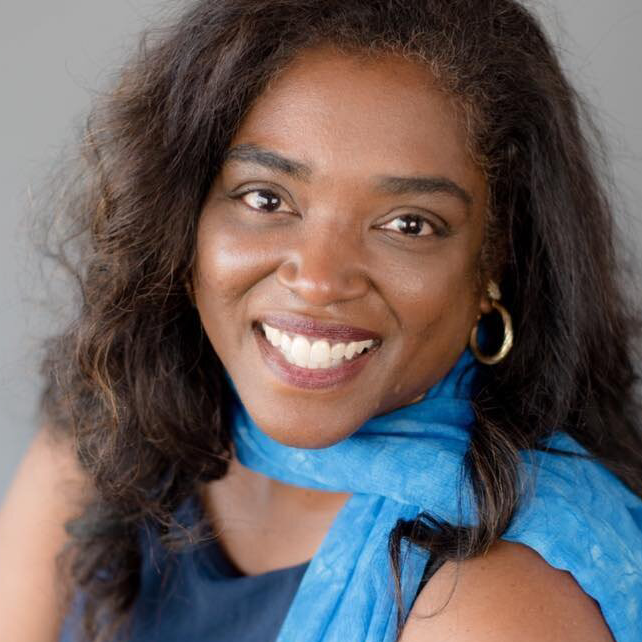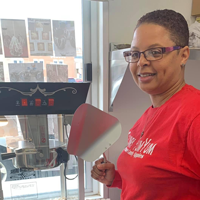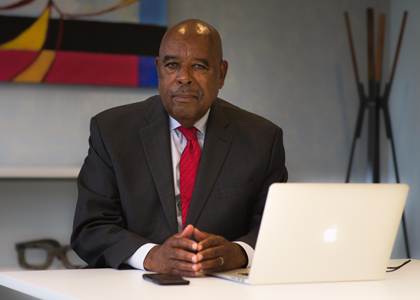Bridging the gap
Black-owned small businesses seek to overcome pandemic challenges
Bridging the gap
Black-owned small businesses seek to overcome pandemic challenges
At the beginning of 2020, A Family Affair Event Management had already filled its schedule for the year with an array of weddings and corporate, social and destination activities. Then COVID-19 struck, wiping the Stafford event planning company’s calendar clean.
“It greatly impacted us,” says Tortica Anderson, owner of A Family Affair Event Management. “We had six destination events canceled and 10 other events on the books with seven canceled and three rescheduled. It was definitely devastating to us financially.”
The pandemic and resulting shutdowns dealt a destructive blow to small businesses across the nation, but challenges to stay afloat were compounded for Anderson and other Black small business owners, who on average have had more difficulty accessing pandemic financial relief on top of the existing U.S. racial wealth gap. According to a report by the U.S. House Committee on Small Business, Black business ownership in the United States declined by more than 40% between February 2020 and April 2020, the largest decrease among any racial group. The Federal Reserve Bank of New York also found that 58% of Black-owned U.S. businesses faced financial hardships before the pandemic, compared with 27% of white-owned businesses.
Small Black-owned businesses “were struggling before the pandemic,” Anderson says. “We feel like we have to work twice as hard to prove we’re capable of being business owners and invest in ourselves to show we’re legitimate businesses. We always have to validate ourselves. Ultimately, I believe the race part has a lot to do with it.”
Anderson obtained a forgivable Paycheck Protection Program loan, established under the federal Coronavirus Aid, Relief, and Economic Security (CARES) Act to help small businesses weather the pandemic. “That helped significantly to get us through that critical time of May through August last year,” she says, noting that she had to refund about $5,000 in customer deposits as the pandemic took hold.
Lending disparities
As of August 2020, Black women represented 36% of all Black business owners in the U.S. and made up more than 40% of new women-owned companies. Along with Anderson, that number includes Destinee Wright, owner of Destinee Marketing, a social media and marketing company that started in Charlottesville and moved to Charlotte, North Carolina. The University of Virginia graduate also launched the Charlottesville Black Business Directory in May to connect Black business owners with the community.
“The goal is to offer resources for Black business support and increase traffic,” she says. “More people understand the importance of supporting Black-owned businesses.”
Wright closed her first business, a mobile hairstyling salon, in March 2020 as the pandemic gripped the nation. She didn’t seek a PPP loan because she was overwhelmed by the program’s requirements. “The general challenge is access to information,” Wright adds. “There should have been more efforts to make sure the information was getting to marginalized communities. It’s important to make sure information is easy to access and easy to navigate for people at all different levels.”
Fewer than 30% of U.S. Black business owners received PPP loans, compared with 60% of white applicants. Critics say disparities arose because the U.S. Treasury Department and the Small Business Administration instructed banks to give preference to existing customers, putting Black business owners without previous banking relationships at a disadvantage.
“Relationships drive businesses,” says Glenn Carrington, dean of Norfolk State University’s School of Business. “Banking is a relationship to some degree. Banks believe in the people they’re making loans to, but many Black small businesses don’t have a history of relationships with banks.”

Many also were overwhelmed by PPP requirements. “In general, small businesses don’t have time to master the Paycheck Protection Program. They don’t understand how to work their way through the system,” Carrington says. “You had to submit applications in a timely manner, and many parties were involved. You can’t just learn that stuff overnight.”
Carrington is working with the 757 Recovery and Resilience Action Framework to develop a networking platform for business owners. “You can’t be on an island by yourself,” he says. “Most small businesses are a one-person shop, and there’s only so much they can do. They have to find a way to link in with the knowledge base.”
Launched by the Hampton Roads Alliance, the 757 Recovery and Resilience Action Framework is designed to accelerate recovery from the pandemic while building a more resilient economy.
“Entrepreneurship is important to the region,” Carrington says. “That’s where most of the jobs are. That’s why we’ve targeted making small businesses more resilient, especially underserved populations that generally don’t have networks to sustain themselves.”
Striving and thriving
Networking among Black business owners is one of Sheila Dixon’s goals as executive director of the Tysons-based Northern Virginia Black Chamber of Commerce. “I want to bring more of the Black community together from a business aspect at all levels and help our businesses prosper,” she says.

Dixon organized conference calls with Black business owners and staff from the offices of U.S. Sens. Mark Warner and Tim Kaine and U.S. Rep. Gerry Connolly (D-Fairfax County) to discuss coronavirus relief. “Those were great conversations. Trust increased,” she says, noting that some business owners had been reluctant to apply for aid due to skepticism that support would materialize.
The chamber also is using a grant from the Community Foundation of Northern Virginia to implement its BTR (Build Thriving Returns) Now program for young entrepreneurs. “There has been a definite increase in Black entrepreneurs during the pandemic,” Dixon notes. “That’s great, but there’s a difference between working for someone as an employee and shifting to being an entrepreneur. It’s definitely a learning experience, and you have to make sure you have the proper resources to do what needs to be done.”
Despite their struggles, many Black business owners found a silver lining in the pandemic, Dixon says. “They put their time into increasing their skill set, especially technology and leveraging social media and adding products and services in a broader way. They were able to revitalize and thrive.”

Ron Beauford, who owns an Amazon logistics trucking firm in Mechanicsville and co-owns Virginia Heritage Foods, an Ashland-based multibrand food distributor to supermarkets, military commissaries and club stores, says the pandemic actually helped his businesses. “People were eating more at home, and our sales grew close to 45%. That’s been sustained even with the country opening back up.”
Despite the pandemic’s devastating effect on restaurants, Tummy-Yum Yum Gourmet Candy Apples in Manassas prospered by expanding its menu to include cupcakes, chocolate-covered pretzels, funnel cakes and frozen bananas. Owner Sharita Rouse also turned to philanthropy, organizing police and local businesses to feed needy families in Prince William County. Police officers delivered meals, while businesses’ monetary and food donations fueled the program.
“Our net for the year 2020 was double during the pandemic,” she says. “We didn’t close our doors one day because we started feeding the community out of the store.”

Rouse estimates that she feeds 600 to 700 people a week. “When you make it happen for others, God will make it happen for you,” she adds. “I knew we were doing what God wanted us to do by feeding people. When the pandemic started, they couldn’t afford to purchase goods from me, but I knew I still needed to help them.”
Growing entrepreneurship
As the result of job layoffs and business closures, Black entrepreneurship grew during the pandemic, says Ervin Clarke, founder and chairman of the Central Virginia African American Chamber of Commerce. “Individuals are taking advantage of opportunities to test the waters and try to live their dreams.”
Most Black business owners are first generation entrepreneurs. “From that standpoint, they don’t have long legacies to fall back on,” Clarke adds. “Anyone without a deep heritage in a particular business could potentially have a problem because their pockets are not as deep.”
Libby Edwards-Allbaugh, co-owner of The Tax Ladies in Charlottesville, spent much of the past year guiding small businesses through the process of how to navigate PPP loans and similar programs. “We’ve seen Black businesses struggle more because they did not have the infrastructure to capitalize on loans,” she says, adding that she encourages clients to invest in support systems. “Don’t think of an accountant or an insurance person as an expense you can’t overcome. Those relationships give you resources to get what you need.”

Many also require training on how to organize and manage a business, Edwards-Allbaugh adds. “We have the motivation and ideas, but the execution is fly by night. We need a network of professionals to help when situations come up.”
That’s what Angela Reddix, CEO of Norfolk health care management and IT consulting firm ARDX, is doing with The Reddix Rules Fund, which provides grants to small businesses owned by women of color. Reddix launched the program to provide $2,020 grants to 20 female Virginia business owners last year during the pandemic. This year, Grow with Google, Atlantic Union Bank, KW Brown Ministries, Doctor SOS, Ferguson Enterprises and Ebony magazine have joined The Reddix Rules Fund to provide more than $20,000 in grants to female entrepreneurs of color.
Out of 100 applicants, 10 were chosen for the program, which includes education in entrepreneurship as well as mental wellness coaching. Entrepreneurs also receive mentoring in preparing a business plan to pitch to executives from the sponsoring companies. The winning participant will receive $10,000, with the second- and third-place entrepreneurs getting $5,000 and $2,000 respectively. The remaining seven women each will receive $500.

“The program is not just to provide funds, but [to] teach business owners how to position themselves to take advantage of opportunities,” Reddix says. “If you don’t have examples of those who are successful to show you how to establish books and payroll, you’re not going to survive.”
And when minority businesses shut their doors, the entire community suffers, she adds. “Every time a Black business closes, that takes us in the wrong direction.”
t














